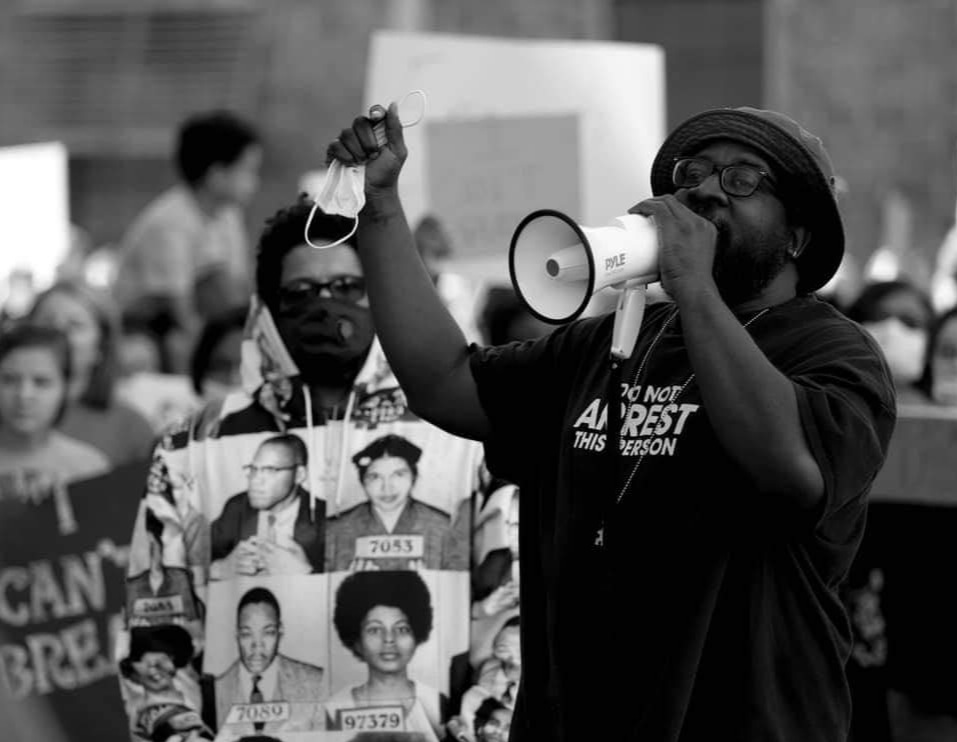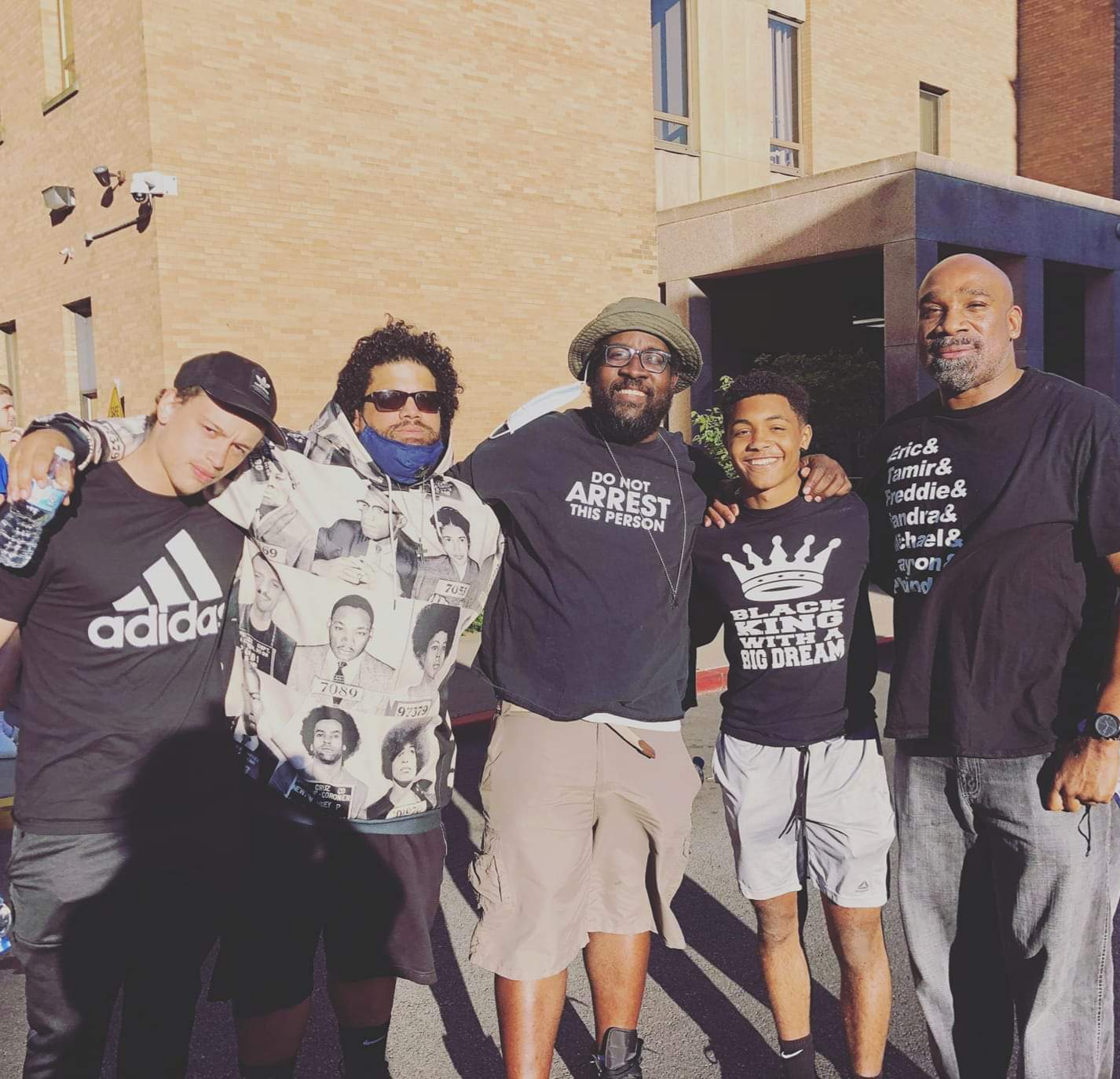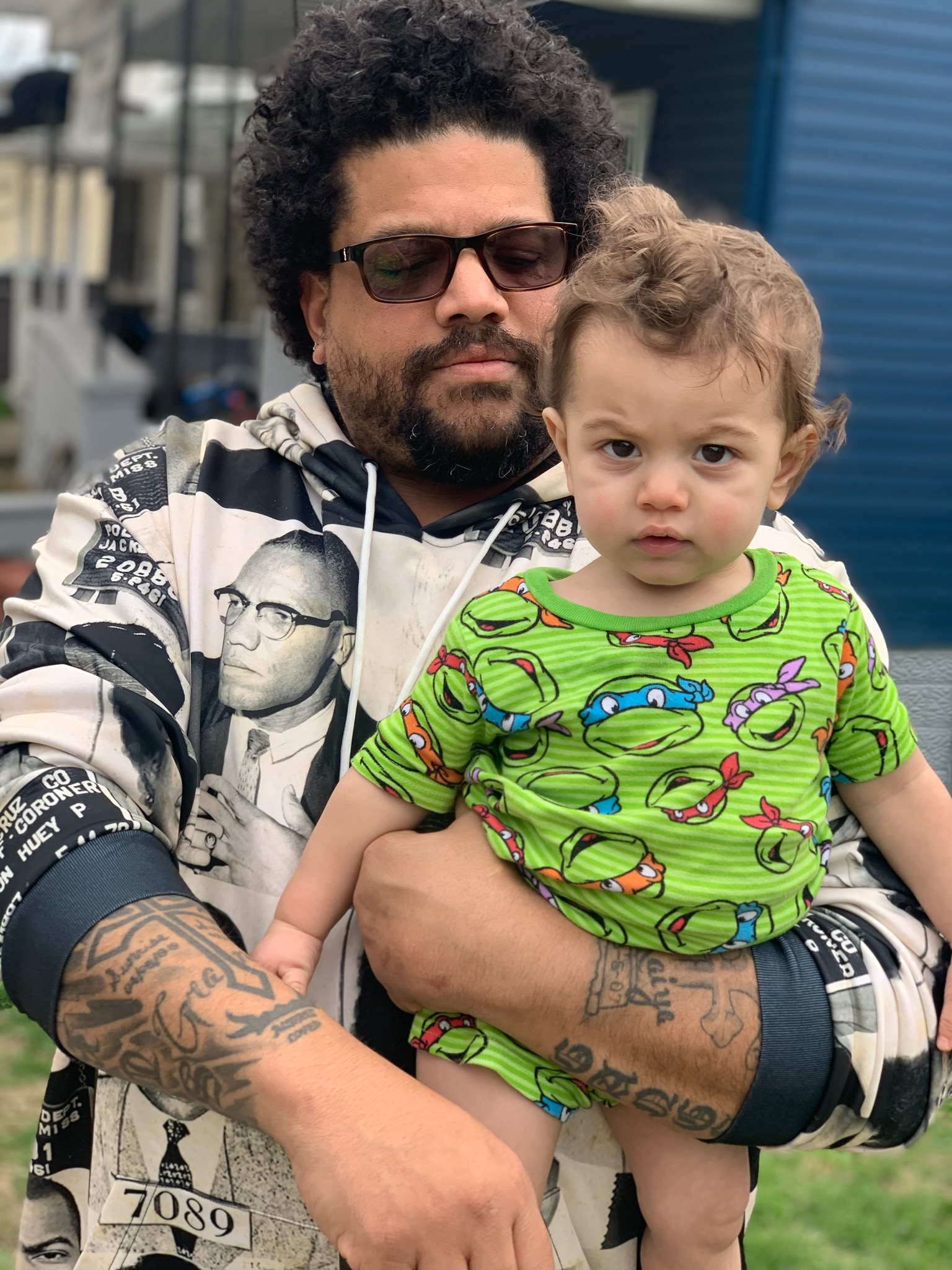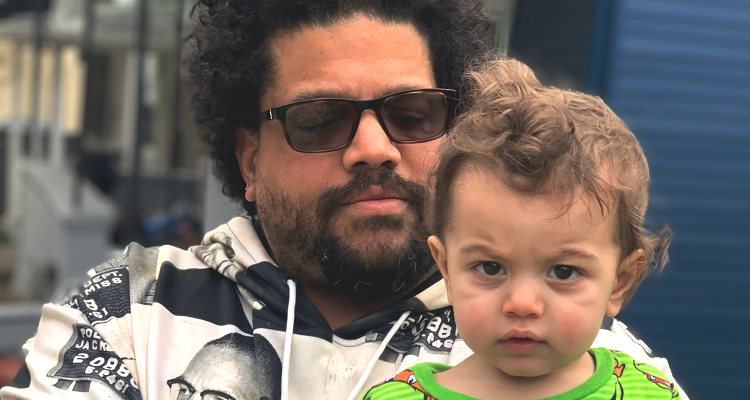Editor’s note: Weelunk is committed to sharing the city’s diverse stories, including those that combat systemic racism. Today’s post features Reuben Rouse, a Wheeling man whose dedication to full-on fatherhood has taken a public turn since the killing of George Floyd.
Watching a fellow black man plead for air as he lay trapped between a police officer’s knee and the asphalt of a Minnesota street might not scream “teachable moment” to every dad. But to one who has already pulled himself out of multi-fold troubles and helps other men do the same whenever he can, it did.
Indeed, Reuben Rouse — 42 and at least the fourth generation of his family to call Wheeling home — feels called by how national events are now playing out just beyond his door. He’s joined with about a dozen black men from the city to speak out at public demonstrations, on social media and wherever the opportunity presents itself.
“I had the motto: ‘(Stay) out of sight, out of mind,’” the local-route truck driver said of how he was living before Floyd’s killing. This low profile was, in part, Rouse said, an after effect of a past that included both substance abuse and self-imposed interactions with police until about a decade ago.
“Before the COVID struck, I worked every day, and I came home. I didn’t have time to be doing anything else,” he said of being both clean and reluctant to speak out publicly against such racism.
That time is over, however.
“This might be God’s plan — for my voice to be heard and, at the end of the day, have the respect of my children for standing up for what’s right. I’m not going to sit here and settle for less.
“It’s an odd thing to say,” Rouse continued during a Weelunk interview conducted on his Warwood front porch. “But, George Floyd’s [alleged] murder may change the world.”

Already, the video-recorded death has led to police firings and murder charges for involved police; large-scale, interracial protests against racism and other discrimination on a global basis; and multiple policy changes across the U.S.
Rouse noted he is also watching how Floyd’s death has motivated still others much closer to home. In recent days, just sitting or grilling on his front porch with his oldest children — forced home from college by COVID — has triggered occasional outrage from strangers.
“People will drive by and yell ‘white power’ or the ‘n-word’ from their car window,” Rouse said. The street where they’re driving is less than three car widths from his front door. “It’s kind of brutal here right now.
“My 5-year-old — he came to me and asked, ‘Is the world going to end?’” Rouse said of coping with a constant swirl of homegrown problems and national news. “You don’t want to hear that from a 5-year-old. I said, ‘Not on my watch.’”
A LONG ROAD
Racism has intensified since Floyd’s death, Rouse said, but added that it isn’t new to his Wheeling experience.
“I don’t look at color of skin and race,” said Rouse, whose father was black and mother was white. After age 4, he was raised by his black grandparents — Reuben Sr. and Ethel Stradwick — in Center and South Wheeling. His 10 children (nine living) are also bi-racial.
“They (racial slurs and taunts) were never taught to me as a child, even though I know wholeheartedly that my family experienced it on a widespread basis. I didn’t know about racism until I dealt with it myself.
“My first experience was at age 5. I got in a fight … he bit me on my back and said, ‘Chocolate,’ and then he called me the ‘n’ word.” Rouse stopped and shook his head in disbelief at this point in the interview. “A little kid, fighting a person the same age as me.
“Considering that I never knew nothing about it (racism) … my grandparents had to speak to me about it. I was raised on love.”
Being mixed race turned out to make things particularly tough, he noted. In middle school especially, he said white classmates perceived him as too dark to fit in, and black classmates didn’t fully accept him because of his lighter skin.
By the time he got to Wheeling Park High School, from which he graduated in 1995, many of those problems ended, however. “I got along with every body. I was the goofy clown that everybody likes, but I still dealt with stuff.
“I even had friends who might call other people the ‘n-word.’ They would say it to other people and then apologize to me. ‘We’re not talking about you,’ they’d say. I’d be like …” Rouse opened his hands but seemed to have no words with which to finish his sentence.
His own children — ages 1 to 23 — have faced some of the same struggles he experienced a generation earlier, while other things have changed, he said.
There have been racial slurs and harassment. But, rather than having to outrun persecutors on their way home from school as Rouse did, he has felt free to ask school officials to intervene when troubles have arisen. One retired principal from Warwood School was particularly effective at handling racism in the school, he said.
That said, Rouse acknowledges his children have to make decisions as to how to respond to racism on a case-by-case basis. He was pleased when the second eldest of his six sons — motivated in part by a pre-college program that requires good behavior — walked away from a race-based incident that turned violent at Wheeling Park a couple of years ago. But, he doesn’t rule out self-defense.
“Me as a parent, I would never tell my children to lay down and die.”
BLACK, WHITE & BLUE
Rouse noted that his activism is primarily about hope.
“This is the most progress I’ve seen (against) racism,” he said, noting he has been encouraged to see white people joining in demonstrations. “A lot of people agree that it has to change.”
One thing Rouse doesn’t want to see changed is an appreciation for good police, whom he believes do a necessary and dangerous job.
This is something he can say based on his own experience. Arrested “multiple times” earlier in his life, he believes that only once was he treated unfairly by law enforcement. Ironically, it was the one time his own activity didn’t lead to the arrest, he added.
While exchanging a child in shared custody, he said the child’s maternal grandmother became angry and called police, whom he said pushed him to the ground on their arrival. Convinced he was guilt free, he fought back and was then subdued to the point he said he had multiple contusions. Rouse said he photographed the bruises and consulted an attorney. No charges or civil actions were filed against him or by him, he said.
That incident is not fondly remembered, but Rouse said another interaction with police — a West Virginia state trooper — is also at the forefront of his mind in recent days.
“One time, I broke down with six kids in the car. A flat tire,” Rouse said. “A police officer stopped to see what was going on, and he could have written all kinds of tickets. The kids weren’t all properly restrained.
“But, he didn’t. He called NTB and … he waited with me until help came. He was a ‘stand up’ kind of guy. There are good cops.”
He had that in mind when he recently discovered one son watching videos of the deaths of black people in police custody. Concerned his son was feeding his mind with violence and hate, he put a stop to it.
“Let us take care of this,” he said of black adults, particularly black men, standing up in the political arena. “You just go ahead and be a kid.”

CHANGE IS POSSIBLE
And, in situations where good is not there — inside or outside law enforcement — Rouse said he knows firsthand that big, beautiful change is possible. That’s what gives him hope.
“I wasn’t always the greatest person,” he said of his late teen years, during which his grandparents kicked him out of the house. “I had it wonderful. I had anything I wanted, but I didn’t want to listen. I had to learn some life lessons on my own.
“I’m the classic case of an ex-knucklehead turned great person.”
Rouse engaged with drugs and alcohol and had multiple run-ins with police before his infant daughter’s death sparked a dramatic change about 12 years ago. He immediately stopped taking drugs. A while later, he was able to get free from alcohol, as well.
“It was time,” he said of embracing the single fatherhood that has his house currently filled with everyone from a college senior headed toward a teaching career to a baby in a “Ninja Turtle” onesie.

Indeed, during his Weelunk interview, the two youngest children drifted on and off the porch, stopping to hug Rouse’s knee and generally check things out. Rouse stopped the interview at one point to check with a pre-adolescent son. “Did he eat?” he asked of the baby’s breakfast.
At another point, he stopped to check on a cleaning schedule with which the older kids were assisting. The household was bustling — which Rouse said he loves.
He loves them, he added. And, he wants better for each of them. And for himself — there’s still a lot of story to tell.
“We don’t have a choice but to speak,” he said of this newfound outspokenness that still makes him nervous at times. “The world is crazy right now.”
He hopes others, including people shaken by a culture that is rocking and reeling underfoot, will join him — if only to consider the black perspective.
“I want people to understand,” Rouse said. “Think about me before you hate me.”
• A long-time journalist, Nora Edinger also blogs at noraedinger.com and Facebook and writes books. Her Christian chick lit and faith-related non-fiction are available on Amazon. She lives in Wheeling, where she is part of a three-generation, two-species household.


